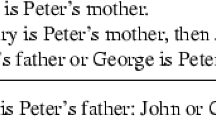Abstract
This paper discusses the philosophical and logical motivations for rejectivism, primarily by considering a dialogical approach to logic, which is formalized in a Question–Answer Semantics. We develop a generalised account of rejectivism through close consideration of Mark Textor’s arguments against rejectivism that the negative expression ‘No’ is never used as an act of rejection and is equivalent with a negative sentence. In doing so, we also shed light upon well-known issues regarding the supposed non-embeddability and non-iterability of force indicators.
Similar content being viewed by others
References
Belnap, N.: A useful four-valued logic. In: Dunn, M. (ed.) Modern Uses of Multiple-Valued Logic, pp. 8–37. Reidel, Boston (1977)
Béziau, J.-Y.: A new four-valued approach to modal logic. Log. Anal. 54(213), 109–121 (2011)
Chiffi, D., Schang, F.: The logical burdens of proof: assertion and hypothesis. Log. Log. Philos. (2017). doi:10.12775/LLP.2017.006
Dummett, M.A.E.: The Logical Basis of Metaphysics. Harvard University Press, Cambridge (1991)
Dummett, M.A.E.: Elements of Intuitionism. Oxford University Press, Oxford (2000)
Dunn, M., Restall, G.: Relevance logic. In: Gabbay, D., Guenthner, F. (eds.) Handbook of Philosophical Logic. Kluwer, Dordrecht (2002)
Edgington, D.: Conditionals, truth and assertion. In: Ravenscroft, I. (ed.) Minds, Ethics, and Conditionals: Themes From the Philosophy of Frank Jackson. OUP Oxford, Oxford (2009)
Font, J.M., Hájek, P.: On Lukasiewicz’s four-valued modal logic. Stud. Log. 70(2), 157–182 (2002)
Frankowski, S.: Formalization of a plausible inference. Bull. Sect. Log. 33(1), 41–52 (2004)
Geach, P., Black, M.: Translations From the Philosophical Writings of Gottlob Frege, vol. 4. Philosophical Library, New York (1952)
Ginsberg, M.: Multivalued logics: a uniform approach to reasoning in AI. Comput. Intell. 4, 256–316 (1988)
Humberstone, L.: The Connectives. MIT Press, Cambridge (2011)
Incurvati, L., Smith, P.: Is "no" a force-indicator? sometimes, possibly. Analysis 72(2), 225–231 (2012)
Keiff, L.: Dialogical logic. Stanford Encyclopedia of Philosophy, Stanford (2010)
Lambek, J., Scott, P.J.: Introduction to higher-order categorical logic, vol. 7. Cambridge University Press, Cambridge (1988)
Malinowski, G.: Q-consequence operation. Rep. Math. Log. 24(1), 49–59 (1990)
Murzi, J., Carrara, M.: Denial and disagreement. Topoi 1, 1–11 (2014)
Parsons, T.: Assertion, denial, and the liar paradox. J. Philos. Log. 13(2), 137–152 (1984)
Pavlov, S.: The logic with truth and falsehood operators from a point of view of universal logic. Log. Univ. 5(2), 319–325 (2011)
Prawitz, D.: Meaning approached via proofs. Synthese 148(3), 507–524 (2006)
Price, H.: “Not” again (Unpublished)
Priest, G.: Doubt Truth to Be a Liar. Oxford University Press, Oxford (2006)
Ramsey, F.: General propositions and causality. In: Mellor, D.H. (ed.) Philosophical Papers, pp. 145–163. Cambridge University Press, Cambridge (1990)
Restall, G.: Multiple conclusions. In: Hajek, V.-V.L.P., Westerstahl, D. (eds.) Logic, Methodology, and Philosophy of Science: Proceedings of the Twelfth International Congress, pp. 189–205. Kings College Publications (2005)
Restall, G.: Assertion, denial and non-classical theories. In: Berto, F., Mares, E., Tanaka, K., Paoli, F. (eds.) Paraconsistency: Logic and Applications, pp. 81–99. Springer, Berlin (2013)
Ripley, D.: Embedding denial. In: Caret, C., Hjortland, O. (eds.) Foundations of Logical Consequence, pp. 289–309. Oxford University Press (2015)
Rumfitt, I.: Yes and no. Mind 109(436), 781–823 (2000)
Schang, F.: Beyond the fregean myth: the value of logical values. In: Stalmaszczyk, P. (ed.) Philosophy of Language and Linguistics, p. 245. Ontos Verlag, Paris (2010)
Schang, F.: The football of logic. Studia Humana (2017) (forthcoming)
Skura, T.: On pure refutation formulations of sentential logics. Bull. Sect. Log. 19(3), 102–107 (1990)
Słupecki, J., Bryll, G., Wybraniec-Skardowska, U.: Theory of rejected propositions. I. Stud. Log. 29(1), 75–123 (1971)
Słupecki, J., Bryll, G., Wybraniec-Skardowska, U.: The theory of rejected propositions. II. Stud. Log. 30(1), 97–145 (1972)
Smiley, T.: Rejection. Analysis 56(1), 1–9 (1996)
Tappenden, J.: Negation, denial and language change in philosophical logic. In: Gabbay, D., Wansing, H. (eds.) What is Negation?, pp. 261–298. Springer, Berlin (1999)
Textor, M.: Is "no" a force-indicator? no!. Analysis 71(3), 448–456 (2011)
Trafford, J.: Structuring co-constructive logic for proofs and refutations. Logica Universalis, Berlin (2016)
van der Schaar, M.: The assertion-candidate and the meaning of mood. Synthese 159(1), 61–82 (2007)
Wansing, H.: Falsification, natural deduction and bi-intuitionistic logic. J. Log. Comput. 26(1), 425–450 (2016)
Willard van Orman, Q.: Methods of Logic. Harvard University Press, Cambridge (1982)
Wright, G.H.V.: Truth-logics. Log. Anal. 30(120), 311–334 (1987)
Author information
Authors and Affiliations
Corresponding author
Additional information
The order of author’s names is arbitrary.
Rights and permissions
About this article
Cite this article
Schang, F., Trafford, J. Is ‘No’ a Force-Indicator? Yes, Sooner or Later!. Log. Univers. 11, 225–251 (2017). https://doi.org/10.1007/s11787-017-0170-7
Received:
Accepted:
Published:
Issue Date:
DOI: https://doi.org/10.1007/s11787-017-0170-7




